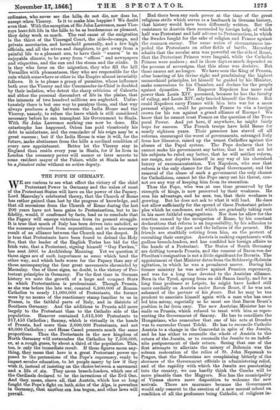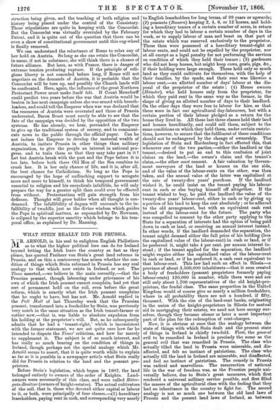THE POPE IN GERALSNY.
WE. are curious to see what effect the victory of the chief Protestant Power in Germany and the union of most of the Protestant States will have on the power of the Papacy. Lord Macaulay's celebrated theory, that the Church of Rome has rather gained than lost by the progress of knowledge, and that all secessions from the Church of Rome during the last 200 years have not been gains to Protestantism, but to in- fldelity, would, if confirmed by facts, lead us to conclude that the Papacy will emerge victorious from its present straggle. It is, true that much of Italy has been driven into unbelief, as the neeessary rebound from superstition, and as the necessary result of an alliance between the Church and the despot. It is true that Protestants have been found to defend the Holy See, that the leader of the English Tories has bid for the Irish vote, that a Protestant, signing himself "Guy Fawkes," has sent ,5001. to Archbishop Manning. Yet we question if these signs are of such importance as some which tend the other way, and which bode worse for the Papacy than any of those accompanying the four great movements chronicled by Macaulay. One of these signs, no doubt, is the victory of Pro- testant principles in Germany. For the first time in German history, we note the growth of a large and compact State in which Protestantism is predominant. Though Prussia, as she was before the late war, counted 6,500,000 of Roman Catholics to nearly 11,000,000 of Protestants, the former were by no means of the reactionary stamp familiar to us in France, in the faithful parts of Italy, and in districts of Southern Germany. And the additions to Prussia add more largely to the Protestant than to the Catholic side of the population. Hanover contained. 1,613,100 Protestants to 217,453 Catholics ; Saxony, which is virtually in the hands of Prussia, had more than 2,000,000 Protestants, and not 40,000 Catholics ; and Hesse Cassel present* much the same proportions. Thus the Protestants in the new kingdom of North Germany will outnumber the Catholics by 7,500,000, or, at asrough guess, by about a third of the population. This, too, is only the immediate result. If these figures mean any- thing, they mean that here is a great Protestant power op- posed to the pretensions of the Pope's supremacy, ready to impart secular education, to let people marry by law if they wish it, instead of insisting on the choice between a sacrament and a life of • sin. They mean breech-loaders, which one of the Cardinals declared to be the inventions of the Evil One. And they, mean, abeve all, that Austria, which has so long fought the Pope's fight on beat sides of the Alps, is powerless in Germany, that, another. era hass begun, and other laws will prevail, Had there been any such power at the time of the great religious strife which serves as a landmark in German history, that history would have been differently written. But the resistance to Austria then succeeded by foreign help, of which half was Protestant and half adverse to Protestantism, in which the Swedes fought for the sake of religion and France against the common enemy. The same union of circumstances im- peded the Protestants on other fields of battle. Macaulay admits that the secular arm was powerful on the side of Rome, that the Protestant Princes were languid, while the Catholic Princes were zealous ; and in those days so much depended on the persons of sovereigns, that this alone was decisive. But those causes act no longer. We have seen the King of Prussia, after boasting of his divine right and proclaiming the highest monarchical principles, let himself be guided by his Minister, make concessions to his Chamber, and declare for the people against dynasties. The Emperor Napoleon has more real power than Louis XIV. possessed, because he has the faculty of ruling, and Louis XIV. only fancied himself the State. But could Napoleon carry France with him into war for a mere personal object, could he persuade France to win a foreign crown for his son against a grand alliance of Europe? We know that he cannot trust France on the question of the Tem- poral Power. And yet her if anywhere, he might fairly hope for success. The French troops have held Rome for nearly eighteen -years. Their presence has staved off all reforms, encouraged the worst of governments, estranged Italy from her liberator, raised up the truest Catholics against the abuses of the Papal system. The Pope declares that he cannot make his government any better, that he will not let his subjects be ruled any better, that he will neither reform, nor resign, nor deprive himself in any way of his cherished luxury of excommunication. Yet Napoleon, who sees that reform is the only chance for the Papal Government, and. the removal of the abuse of such a government the only chance for Catholicism, cannot let the Pope carry out his threat, can- not see any way of keeping him from its execution. Thus the Pope, who was at one time preserved by the strength of kings, is now preserved by their weakness, lie sees his advantage, and he sees, too, that their weakness is growing. But he does not ask to what it will lead. He does not allow sufficiently for the spread. of those Protestant panels plea which he condemns, and which are gradually taking root in his most faithful congregations. Nor does he allow for the reaction caused by the occupation of Rome, by his constant declarations that reform is an impossibility, by his adhesion to the tyrannies of the past and the failures of the present. His friends are stealthily retiring from him, on the pretext of recruiting their energies. Austria is making experiments with godless breech-loaders, and has confided her foreign affairs to the hands of a Protestant. The States of South Germany are drifting towards Prussia, and. the rumour of Baron von der Pfordten's resignation is not a little significant for Bavaria. The appointment of that Minister dates from the Schleswig-Holstein agitation, in which he was a prominent mover. During his former ministry he was active against Prussian supremacy, and was for a long time devoted to the Austrian alliance. Born in the Tyrol, sprung from an old Saxon family, and for a long time professor at Leipsic, he might have looked still more cordially on Austria under Earon Beust, if he was not ashamed of the partner of his fiasco. But he may be too prudent to associate himself again with a man who has once led him astray, especially as he must see that Baron Beust's position is far from easy. The new Austrian Minister has to smile on Prussia, which refused to treat with him as repre- senting the Government of Saxony. He has to conciliate the Hungarians, who remember that one of his acts at Dresden was to surrender Count Teleki. He has to reconcile Catholic Austria to a change in the Concordat in spite of the Jesuits, and he has either to reconcile the whole of Austria to the return of the Jesuits, or to reconcile the Jesuits to an indefi- nite postponement of their return. Seeing that one of the first attempts to alleviate the misery of Bohemia was the solemn restoration of the relics of St. John Nepaniuk to Prague, that the Bohemians are complaining bitterly of the slowness of the Government officials in administering relief, and of the rapidity with which the Jesuits are penetrating into the country, we can hardly think the Czechs will be more placable than the Magyars. Nor has the municipality of Vienna shown more disposition to welcome the new. arrivals. There are murmurs because the Government would. only consent to the erection of a new normal school on condition of all the professors being Catholic, of religious
struction being given, and the teaching of both religion and history being placed under the control of the Consistory. These stipulations are quite in keeping with the Concordat. But the Concordat was virtually overruled by the February Patent, and it is quite out of the question that there can be even a show of constitutional government until this cog-wheel is finally removed.
We can understand the reluctance of Rome to relax any of her hold on Austria. So long as she can retain the Concordat, in name, if not in substance, she will think there is a chance of future affiance. But here, as with France, there is danger of extreme tension producing rupture. If the principle of reli- gious liberty is not conceded before long, if Rome will not negotiate on the demands of Austria, it is probable that the Concordat will be torn up, and possibly the Church lands will be confiscated. Here, again, the influence of the great Northern Protestant Power must make itself felt. If Count Mensdorff could predict two years before the war that Austria would be beaten in her next campaign unless she was armed with breech- loaders, and could tell the Emperor when war was declared that the resources of Austria were overrated and those of Prussia underrated, Baron Beust must surely be able to see that the fate of the campaign was decided by the opposition of the two systems. He has already, we hear, persuaded the Emperor to give up the traditional system of secrecy, and to communi- cate news to the public through the officiarpaper. Can he not induce the Emperor to develop the material wealth of Austria, to imitate Prussia in other things than military organization, to give the people an interest in national pro- gress, and to train them so that they may take part in it ? Let but Austria break with the past and the Pope before it is too late, before both these Old Men of the Sea combine to crush her. It is her only chance of life, and it is, after all, the best chance for Catholicism. So long as the Pope is encouraged by the hope of unflinching support to arrogate more and more to himself, to think his temporal government essential to religion and his encyclicals infallible, he will only prepare the way for a greater split than could ever be effected from without. Protestantism will gain strength from his defiance. Thought will grow bolder when all thought is con- demned. The infallibility of dogma will succumb to the in- fallibility of twaddle, just as the divine wisdom which guides the Pope in spiritual matters, as expounded by Dr. Newman, is eclipsed by the superior sanctity which belongs to his tem- poral office, as explained by Dr. Manning.































 Previous page
Previous page